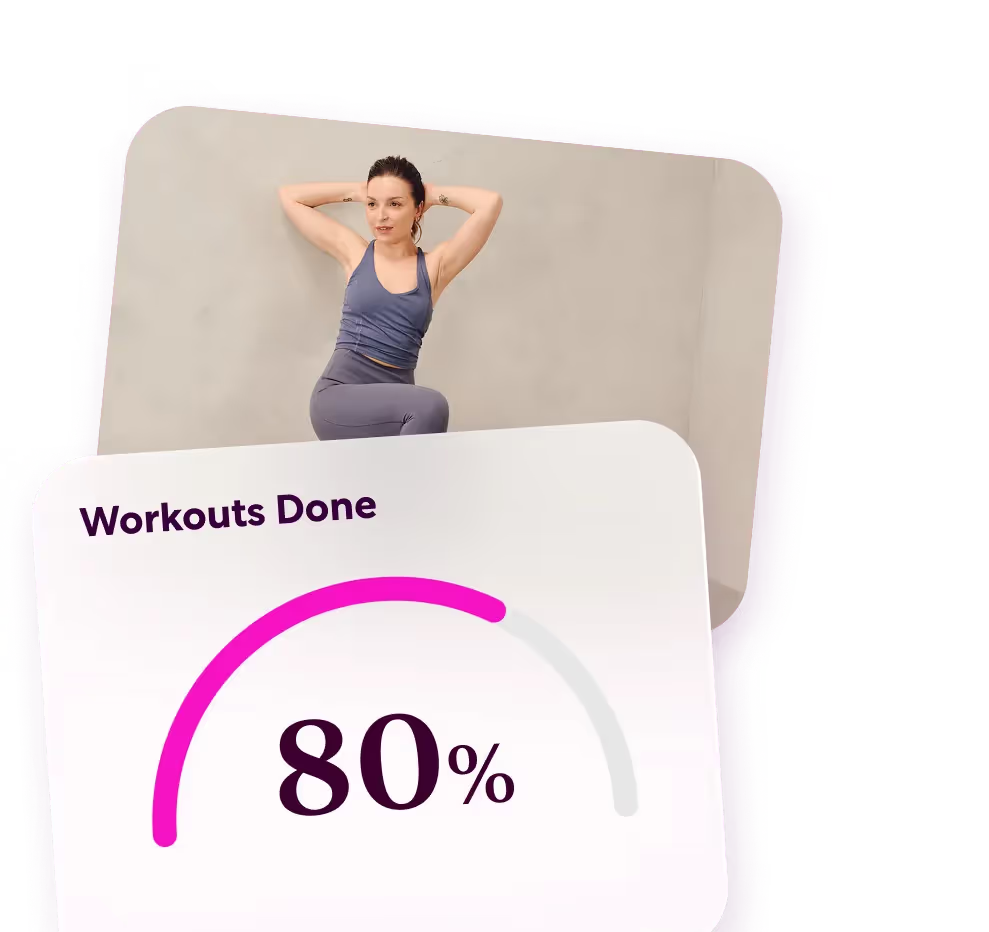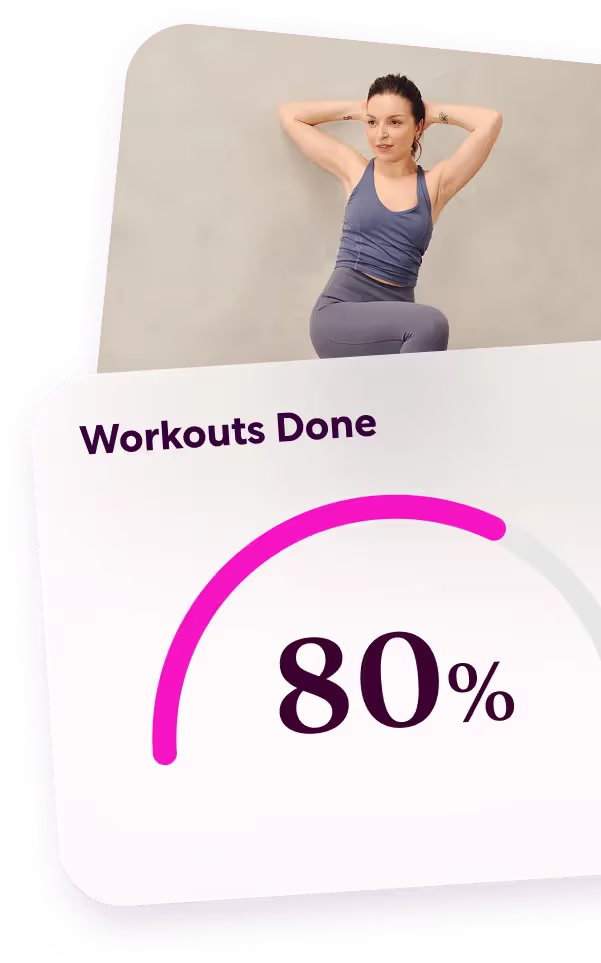15 mins Pilates on your terms – anytime, anywhere.
Get your plan
15 mins Pilates on your terms – anytime, anywhere.
Get your plan
Chances are that if you are researching wellness apps you have come across Reverse Health and Simple.Life.
Two popular apps that aim to improve health and wellness, however, they have very different approaches to doing it.
In this article, we compare Reverse Health and Simple.Life. We explore how each program works, the key differences, pricing, and pros and cons to help you decide which is best for you.
How Each Program Works

From the outside, Reverse Health and Simple.Life appears to be your standard health and wellness app, however, there are several differences that not only set them apart from one another but also other apps on the market. Below we explore how each works to help you determine which is better for you.
Reverse Health’s Approach to Weight Loss & Wellness
Reverse Health is a wellness app specifically designed for women over 40. This is a time when women’s health changes as reproductive hormones fluctuate and decline, leading to menopause and its quality of life-altering symptoms.
Reverse Health aims to guide users toward better health through evidence-based nutrition practices and physical activity. The app offers a holistic approach to wellness, providing Pilates, chair yoga, somatic workouts, and meal plans, to educate and improve quality of life, to not only survive the throws of menopause but also thrive in the year beyond.
Simple.Life’s Focus on Habit Change & Minimalism
Simple.Life is a weight loss app that focuses on habit-building and mindful living. The app uses AI coaching developed by behavioral experts and dietitians to guide you through your weight loss journey.
Simple.Life provides recipes, meals, menus, and grocery functions all in minimalistic packaging to help you lose weight without needing to obsess over the finer details. Aiming to have you feeling happy and healthy, rather than hyper-focused on numbers.
Key Feature Comparison Reverse Health and Simple.Life
The platforms aim to service similar markets, however, their approaches are completely different. Below we highlight the key difference between Reverse Health and Simple.Life.
Personalization and Coaching Support
Reverse Health and Simple.Life offers personalized service to meet your nutrition and wellness goals.
Simple.Life requires the input goals, age, weight, height, activity level, meal schedule, and motivation to formulate a customized plan. This comes with an estimated time to achieve before you can then explore the process. Here the AI coach ‘Avo’ will provide feedback and suggestions to guide you toward better health.
Reverse Health similarly identifies your goals, assessing your training frequency, body type, target zones, training duration, sleep, exercise, and menopause. It then develops a plan based on the criteria. Personalized fitness and nutrition support is offered by a coach who checks in, helping you adjust and tweak your plan to help you break through plateaus to achieve incredible results.
Meal Planning and Nutritional Guidance
When it comes to health and weight loss apps, no platform is complete without meal planning and nutritional guidance. Fortunately, Reverse Health and Simple.Life offers this function, however, their subtle differences make for different experiences.
Reverse Health provides a streamlined, easy-to-follow meal plan based on your dietary requirements, covering keto, Mediterranean, and vegan diets. Meals come with macronutrient breakdowns, ingredients, and instructions alongside a shopping list function guiding better meal prep. This information can then be used for coaching purposes to guide users toward
Simple.Life on the other hand removes nutritional nitty gritty in favor of a nutritional score system that highlights criteria including such as protein, sugar, and fiber content, to guide users toward better eating habits. Recipes can be selected, and foods can be added through typing, photos, or voice controls, improving the user experience.
Tracking Methods: Weight Loss vs. Habit Formation
Reverse Health and Simple.Life offers variations of the traditional tracking methods which make for an easy-to-follow user experience.
Reverse Health recommends different meals and recipes from its extensive database each day, providing healthy meal ideas to users. Here users can select the meals, choose alternative meals, or add their own. This is logged alongside hydration, mood, and exercise each day in a simple navigation system.
Simple.Life on the other hand utilizes its nutrition score system to form healthy habits, aiming to change the behaviors that surround food choices. Here foods are given a score from 1 (low quality) to 4 (optimal). As mentioned, this system streamlines the tracking, removing those small details. It’s here that Avo goes to work, providing encouragement, insights, and recommendations to promote health habits.
Lifestyle Flexibility and Long-Term Sustainability
When it comes to diets and nutrition programs, flexibility and sustainability can break an entire experience.
Reverse Health curated, streamlined program is less comprehensive than other nutrition tracking apps on the market, however, its insights provide the foundation for further education which can be expanded on through the ‘grow’ tab. While the system is streamlined, it provides a base, educating users on basic nutrition principles that they will be able to fall back on in the event they stop using the application.
Meanwhile, Simple.Life’s nutrition score system limits nutritional information in favor of usability. The problem here is that when users do not have access to the app or have signed off the service, they don’t have the fundamentals to fall back on.
Sure, you could argue that they will understand good and bad food choices, however, without an understanding of calories and macronutrients can lead to increased calorie intake, resulting in weight gain, and impacting long-term sustainability.
Pricing and Membership Options
For many, pricing is a major deciding factor for potential users. Below, we explore pricing for each platform to show you which app provides the best value for money.
Reverse Health Pricing Breakdown
Reverse Health Pricing Options
Reverse Health costs $15.19 per month and does not offer a free trial. This equates to approximately $2.65 per week which is excellent value for money.
This price provides access to essential functions such as recipes, meal plans, fitness, and trackers. Reverse Health also offers resources at an additional cost ($17.99), including:
- Fast Food Diet eBook
- Detox Diet eBook
- Sweat Treats eBook
- Alcohol Guide eBook
Simple.Life Subscription Plans
Simple.Life offers free and premium versions. The free version of the app provides basic features, while the premium unlocks all features including coaching, personalized check-ins and actions from Avo, and the education library. Premium subscription prices vary, with in-app purchases listed at $14.99, $29.99, $39.99, and $49.99.
Which Program Delivers Better Results?

Reverse Health and Simple.Life strives to provide its users with powerful weight loss and health management solutions, in a user-friendly, streamlined experience. However, the slight differences in their approach can vary user experience.
Success Stories and Customer Reviews
Below we explore success stories, customer reviews, and the science behind each to determine which will give you the best results.
Reverse Health
“The program helped me get ready for my Mount Everest Base Camp Trek goal, a dream come true. I lost 30 lbs. I feel 15 years younger. I have more energy and more confidence. I am much happier.”
Anne, 59
“I’ve been doing this amazing program for a year now and I’ve lost 97 lbs. I’m not stating this to brag but to let everyone know it is possible to make these life changes.”
Lisa, 58
“The fitness videos, especially Wall Pilates were a game changer for me, I love them. So easy and incredibly effective, I love seeing myself in the mirror now.”
Mitzi, 55
Simple.Life
“It’s been life-changing to see my eating habits in a whole new way. Simple taught me to be more mindful of my meal planning”
Joelle
“I’ve lost a pant size, I’ve lost 10 pounds, my clothes are loose… I have more energy and mental clarity —- so many good things have come to me!”
Teresa
Scientific Backing and Expert Opinions
It’s clear that users of Reverse Health and Simple.Life has achieved great results, but how does this happen? Below we explore the science behind each to provide you with insight into what makes these apps so effective.
Reverse Health
Reverse Health’s approach to health and weight management is centered around evidence-based principles of correct nutrition and exercise.
The app focuses on educating its users on calorie and macronutrient management to control weight and manage health after 40. Research shows that a calorie deficit is the biggest factor in weight loss. This is when we consume fewer calories than we burn daily.
This is sustained by a nutrient-dense diet that helps provide complex carbohydrates, protein, and healthy fats to fuel the body, maintain satiety, and support many of the body’s systems.
Evidence shows that complex carbohydrates contain fiber, both of which provide a slow release of energy and maintain satiety.
Meanwhile, sources reveal that dietary protein helps build and preserve lean muscle while offering a satiating effect and boosting metabolism, providing powerful effects for weight loss.
Lastly, healthy fats help support many of the body's systems. Studies show that healthy fats such as omega-3 fatty acids in particular prove beneficial for women experiencing menopause symptoms.
Each meal in Reverse Health’s database comes from an evidence-based background, created and presented to its users to not only manage weight but improve quality of life.
Additionally, the Reverse Health prescription of exercise is backed by evidence. Studies show that resistance training can improve bone mineral density and physical function, which is essential for women entering menopause.
Based on these findings they have built a growing database of exercise methods such as Pilates, wall Pilates, chair yoga, and more to improve preserve function and improve quality of life.
Simple.Life
Simple.Life takes a different approach to weight loss. While it is based on healthy nutrition principles, its focus is more on making healthy, balanced eating choices which aims to make users feel more confident and in control with food.
While there is a focus on nutrient intake such as carbohydrates, fiber, protein, and fats, there is no direct macronutrient tracking or calorie counting. Instead, the platform aims to coach you using behavioral change techniques to meet your nutrition requirements.
Evidence shows that body weight is influenced by genetic, metabolic, behavioral, environmental, cultural, and socio-economic factors. It explains that behavioral modification including improving lifestyle habits such as diet, exercise, stress factors, and support symptoms is effective for sustainable weight maintenance.
Sources suggest that high-stress levels are associated with weight gain, contributing to obesity, showing how interventions such as stress management techniques.
Based on these findings, Simple.Life streamlines the nutrition tracking process allowing users to focus on the behavioral aspect of weight loss to address the triggers.
Pros and Cons of Reverse Health vs. Simple.Life

Reverse Health and Simple.Life are polished weight loss platforms, however, this does not mean they are perfect. Below we explore the pros and cons to give you more insight into each product.
Pros and Cons of Reverse Health
Advantages
Reverse Health offers premium women’s health products at a reasonable price. Focused on serving women 40 years and over, each meal, recipe, workout, and article is created to improve women’s health.
The team's passion comes through in the product, with a growing database of recipes, exercises, and workouts. This is bolstered by a closed support group for subscribers, where nearly 80,000 women support one another and share their health and wellness journey.
Drawbacks
Reverse Health’s nutrition is scaled back compared to other applications, which may be insufficient for those looking for deeper nutrition capabilities. However, the basics of calorie and macronutrients present enough insight without being overwhelming, providing a foundation for future education.
H3: Pros and Cons of Simple.Life
Advantages
Simple.Life’s focus on behavior over numbers presents a viable and effective method for weight loss. Its implementation of AI alongside its nutrition scoring systems and food scanner takes the guesswork out of diet and nutrition, eliminating those finicky functions that make the weight loss process feel tedious.
This creates a unique experience that will certainly have its share of fans who want a user-friendly weight management experience.
Drawbacks
While removing nutritional information can streamline the weight loss process, it can lead to poor education regarding understanding calorie and macronutrient intake which are essential for long-term weight loss. This may lead users to lose control of their healthy eating habits once they stop using the app.
Furthermore, the lack of exercise and workout databases and human coaching may lead many to switch to more comprehensive weight loss apps that include these functions.
Final Thoughts: Choosing the Right Wellness Program

Reverse Health and Simple.Life are both powerful platforms for guiding you through your weight loss journey. While they both aim to help you lose weight, their approach to weight management and improving health is very different.
Key Takeaways from the Comparison
Reverse Health’s focus on women over 40 means every aspect from nutrition, exercise, education, and community is developed around addressing the common struggle women face during their fourth decade. More than just a fitness app, it is a growing wellness platform that helps women understand their bodies to set them up with better health and longevity. This combined with the affordable price take of just $2.65/week makes it an amazing investment.
Simple.Life’s streamlined approach to nutrition and focus behavioral changes can be incredible for addressing weight loss. The added assistance of AI coach Avo provides real-time feedback and recommendations that can improve the weight loss process. However, its scaled-back nutrition and lack of exercise database may be enough to persuade users to jump to other apps on the market.
Making the Best Choice for Your Goals
Choosing between Reverse Health and Simple.Life ultimately comes down to your goals.
Reverse Health is excellent for:
- Women over 40
- People who want a streamlined weight loss experience
- Education about calorie and macronutrient intakes
- Women who want to develop a foundation for long-term health and longevity
- Women who need assistance addressing menopause symptoms
- Who have a limited budget to invest in weight loss apps
Simple.Life is great for:
- All genders and ages
- People who don’t want the nitty gritty numbers
- Individuals who prefer to change their behavior
These platforms service niche markets within the industry and making your choice comes down to which approach aligns with your personal preferences. If you are still undecided, we recommend trying both. The experience of using each app will help you make an informed decision on which app is best for you.
15 mins Pilates on your terms – anytime, anywhere.
Get your plan
Sources
- Kim, J.Y. (2020) ‘Optimal diet strategies for weight loss and weight loss maintenance’, Journal of Obesity & Metabolic Syndrome, 30(1), pp. 20–31. doi:10.7570/jomes20065. https://pmc.ncbi.nlm.nih.gov/articles/PMC8017325/
- Holesh, J.E., Aslam, S. and Martin, A. (2025) ‘Physiology, Carbohydrates’, in StatPearls [Internet]. Treasure Island (FL): StatPearls Publishing. https://www.ncbi.nlm.nih.gov/books/NBK459280/
- Halton, T.L. and Hu, F.B. (2004) ‘The effects of high protein diets on thermogenesis, satiety and weight loss: a critical review’, Journal of the American College of Nutrition, 23(5), pp. 373–385. doi:10.1080/07315724.2004.10719381. https://pubmed.ncbi.nlm.nih.gov/15466943/
- Office of Dietary Supplements (ODS), National Institutes of Health (NIH), Omega-3 Fatty Acids - Health Professional, Available at: https://ods.od.nih.gov/factsheets/Omega3FattyAcids-HealthProfessional/
- Watson, S.L., Weeks, B.K., Weis, L.J., Harding, A.T., Horan, S.A. and Beck, B.R. (2018) ‘High-intensity resistance and impact training improves bone mineral density and physical function in postmenopausal women with osteopenia and osteoporosis: The LIFTMOR randomized controlled trial’, Journal of Bone and Mineral Research, 33(2), pp. 211–220. doi:10.1002/jbmr.3284. https://pubmed.ncbi.nlm.nih.gov/28975661/
- Olateju, I.V., Ogwu, D., Owolabi, M.O., Azode, U., Osula, F., Okeke, R. and Akabalu, I. (2021) ‘Role of behavioral interventions in the management of obesity’, Cureus, 13(9), e18080. doi:10.7759/cureus.18080. https://pmc.ncbi.nlm.nih.gov/articles/PMC8522530/
- Mouchacca, J., Abbott, G.R. and Ball, K. (2013) ‘Associations between psychological stress, eating, physical activity, sedentary behaviours and body weight among women: a longitudinal study’, BMC Public Health, 13, 828. doi:10.1186/1471-2458-13-828. https://bmcpublichealth.biomedcentral.com/articles/10.1186/1471-2458-13-828
FAQs
Which program is more effective for women over 40: Reverse Health or Simple.Life?
Reverse Health is designed specifically for women over 40, focusing on hormonal balance, metabolic health, and sustainable fat loss. Simple.Life is more general and may not address midlife changes as directly.
Do Reverse Health and Simple.Life offer personalized meal plans?
Yes. Reverse Health provides meal plans tailored to hormone shifts and age-related metabolism. Simple.Life offers healthy eating guidance but is less targeted to women 40+.
What are the key differences between Reverse Health and Simple.Life?
Reverse Health specializes in weight loss and energy support for women 40+, with a strong focus on mindset and hormones. Simple.Life promotes general healthy habits without specific age or hormone focus.
Are there real user reviews for Reverse Health and Simple.Life?
Yes. Reverse Health has thousands of verified reviews from midlife women. Simple.Life also has positive feedback, but fewer reviews specific to women over 40.
Which program fits a busy lifestyle better — Reverse or Simple.Life?
Reverse Health is app-based, flexible, and built for women balancing work, family, and energy shifts. Simple.Life is lower-tech and may require more self-direction.







